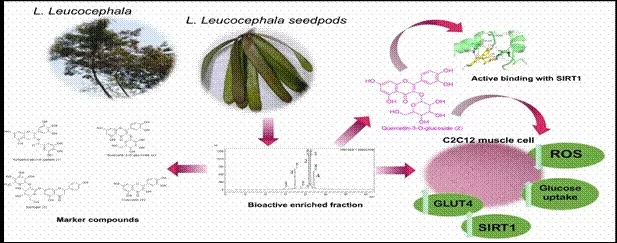Researchers have identified the therapeutic potential of the seedpods from the traditional medicinal plant Subabul in managing insulin resistance related to type II diabetes and developed a marker-assisted fraction and four active compounds from it.
Subabul or Leucaena leucocephala (Lam.) de Wit is a fast-growing leguminous tree commonly found in tropical and subtropical regions. The leaves and immature seeds are eaten in the form of soups or salad, both raw and cooked, providing a rich source of protein and fibre, leading to its traditional usage in human and animal food by different ethnic communities.
 Researchers in the CBL-I at Institute of Advanced Study in Science and Technology (IASST), Guwahati, an autonomous institute of Department of Science and Technology, investigated the therapeutic potential of the seedpods from the traditional medicinal plant Subabul in managing insulin resistance related to type II diabetes.
Researchers in the CBL-I at Institute of Advanced Study in Science and Technology (IASST), Guwahati, an autonomous institute of Department of Science and Technology, investigated the therapeutic potential of the seedpods from the traditional medicinal plant Subabul in managing insulin resistance related to type II diabetes.
A team consisting of Abhipsha Saikia, Pranamika Sarma and Prof. Jagat C Borah have developed a bio-activity guided fraction and four active compounds, by selecting the most active fraction after screening all the fraction for their bio activity.
The bioactive fraction showed enhanced insulin sensitization in free fatty acid-induced skeletal muscle cells (C2C12).
Further, isolated active compound quercetin-3-glucoside from the plant showed upregulation of mitochondrial deacetylase enzyme Sirtuin 1 (SIRT1), which regulates insulin sensitivity along with the upregulated GLUT2 (a protein that helps move glucose and fructose across cell membranes) translocation.
Stable interactions of quercetin-3-glucoside with the SIRTI residue through the formation of hydrogen bonds during molecular docking studies were also observed.
The study published in the journal ACS Omega, demonstrated the therapeutic potential of this plant in enhancing glucose uptake, following the ethnobotanical claim of the plant being used for diabetes and related diseases.











